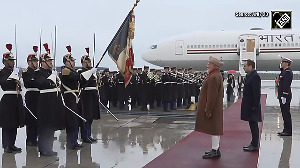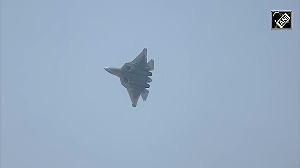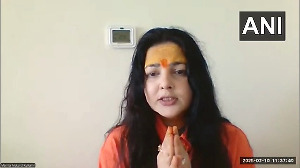Hussain actually wanted an extension in the tenure of the assemblies with the Muttahida Majlis-e-Amal's consent but MMA leader Rehman clearly told him that he wanted only a fair and free election on time. Rehman then called North West Frontier Province Chief Minister Akram Khan Durrani and instructed him to see Hussain personally in Islamabad and convey to him that if a state of emergency was imposed, the ruling MMA would dissolve the provincial assembly and if the federal government contemplated any other option, the MMA would resist it on the streets.
Rehman returned from Tehran and participated in the first-ever Opposition public meeting in Rawalpindi on August 14 without the Pakistan People's Party. The message of that public meeting was loud and clear. The Opposition would not accept General Pervez Musharraf as president in uniform, and that he could not survive just by engaging exiled former prime minister Benazir Bhutto. The next day Rehman was told that if the Opposition parties were determined to push the government to the wall then they must be ready for martial law.
Once again Pakistan stands at the crossroads.
For the West, Pakistan is regarded as the centre of Islamic militancy in the region and a hiding place for Osama bin Laden. The West is trying to control this unstable nuclear power through a military president. On the other hand, a majority of Pakistanis think that presidents in military uniform are not a solution, that military uniforms in politics have always been part of Pakistan's problems.
Sixty years after the creation of Pakistan it is not yet decided who will rule the country -- the military or civilians. Pakistan was created through a political struggle, but, unfortunately, politicians have ruled Pakistan only for 28 of the first 60 years. Military rule entered its 32nd year in 2007.
Historical facts tell us that the politicians always added territory to Pakistan but this country only lost territory when the army was in power. Pakistan liberated a big part of Kashmir in 1948 without the active participation of the army when Liaquat Ali Khan was prime minister. The port city of Gawadar was part of Masqat, now Muscat, in 1947 but it became part of Pakistan in September 1958 when Malik Feroz Khan Noon was prime minister.
Pakistan lost big territory in west Pakistan (Punjab and Sindh) during the war with India in 1971 when General Yahya Khan ruled the country. Then prime minister Zulfiqar Ali Bhutto got back the lost territory in 1972 with more than 90,000 PoWs after the Simla agreement with then Indian prime minister Indira Gandhi.
Once again Pakistan lost the Siachen heights to India in 1984 when General Zia-ul Haq ruled the country. Whenever the army has been involved in politics, Pakistan received injuries. Whenever the army was in power, Pakistan had wars with India (1965 and 1971). Unfortunately, Pakistan's generals have never learnt lessons.
Today Pakistan's generals need to learn lessons from our history, not from the US government. The fact of the matter is that Pakistan was weakened during military governments and strengthened during political governments but our friends like the US have always supported military governments and imposed sanctions on political governments.
It was Zulfiqar Ali Bhutto who invited nuclear scientist Dr Abdul Qadeer Khan from Holland to Pakistan in 1976 and started the country's nuclear programme. Pakistan tested its nuclear devices in May 1998 when Nawaz Sharif was prime minister. Interestingly, then army chief General Jehangir Karamat advised Sharif to refrain from the nuclear tests because the Americans were not happy. Pakistan became a nuclear power through a major role played by A Q Khan but today the father of Pakistan's nuclear bomb is under house arrest in Islamabad without any formal case registered against him, because the US is not happy with him.
The generals are being advised to repeat their mistakes. Today the US is pushing the Pakistan army in North and South Wazirastan against Pakistanis in the name of the war on terror.
This year many people in Pakistan's tribal areas observed Independence Day as Black Day. Today, the Pakistan army is under attack in tribal areas as well as in the settled areas of Punjab. There is a mushrooming growth of suicide bombers. Most of these bombers are angry because their homes were bombed by the army or their relatives were killed in army operations. There is a red alert in all the big cities of Pakistan. Intelligence agencies have issued warnings that dozens of suicide bombers have entered Islamabad and other cities to target the security forces.
Musharraf is really worried because his troops are losing their lives in someone else's war. But the US is putting pressure on him to strike a deal with exiled PPP leader Benazir Bhutto to fight Islamic extremism. Musharraf and Bhutto had a quiet meeting a few weeks ago in Abu Dhabi without any breakthrough. Both leaders faced lot of questions about their credibility after that meeting.
Former prime minister Nawaz Sharif gained after the Musharraf-Bhutto encounter. He refused a similar meeting with Musharraf. He has also formed a broadbased Opposition alliance against Musharraf without Bhutto. Sharif plans to return to Pakistan next month with the Supreme Court's blessing.
Musharraf knows that Sharif will create a lot of political problems for him because he is the most popular leader in Punjab. A political agitation lead by Sharif may provoke martial law in the country. That is why many government officials mention the possibility of martial law these days.
Some Musharraf advisers are also aware that martial law is not a solution to the current political crisis. So they are trying to convince both Bhutto and Rehman to forget their differences and cooperate with each other like they did during 1993 to 1996.
This time the US has no objection on engaging Rehman. US Undersecretary of State for South Asia Richard Boucher met a close aide of Rehman, Ghafoor Haidri, a few days ago in Islamabad. Musharraf's advisers want Rehman to break away from Jamaat-e-Islami President Qazi Hussain Ahmad and form a new alliance with the Awami National Party to work towards normalising the situation in the tribal areas. But Rehman is not ready to break his ties with Qazi.
Rehman believes that if there is no understanding between the government and the Opposition, the country faces martial law and a bloody civil war.
On the other hand, lawyers, media and workers of many Opposition parties are not scared of another spell of martial law. Many political analysts and constitutional experts believe that in case of a deep crisis, Musharraf will have only one option, and that is to resign as president and army chief. Many believe that Pakistanis are ready to fight martial law with the firm belief that Musharraf will be the last military dictator; no other general will dare to interfere in politics after Musharraf.
Martial law will be a real test of the judiciary, media, politicians and civil society. By defeating it, a new nation could be born.
Hamid Mir is Executive Editor, Geo TV, Islamabad.






 © 2025
© 2025